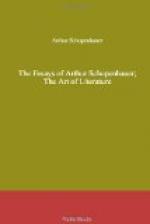For such an amount of hasty writing is done in these days that it is really difficult for anyone who reads much of it to avoid contracting its faults, and thus gradually coming to terms of dangerous familiarity with bad methods. This advice will be especially needful if things that have little or no claim to be called literature at all—the newspapers, the monthly magazine, and the last new tale of intrigue or adventure—fill a large measure, if not the whole, of the time given to reading. Nor are those who are sincerely anxious to have the best thought in the best language quite free from danger if they give too much attention to the contemporary authors, even though these seem to think and write excellently. For one generation alone is incompetent to decide upon the merits of any author whatever; and as literature, like all art, is a thing of human invention, so it can be pronounced good only if it obtains lasting admiration, by establishing a permanent appeal to mankind’s deepest feeling for truth and beauty.
It is in this sense that Schopenhauer is perfectly right in holding that neglect of the ancient classics, which are the best of all models in the art of writing, will infallibly lead to a degeneration of literature.
And the method of discovering the best qualities of style, and of forming a theory of writing, is not to follow some trick or mannerism that happens to please for the moment, but to study the way in which great authors have done their best work.
It will be said that Schopenhauer tells us nothing we did not know before. Perhaps so; as he himself says, the best things are seldom new. But he puts the old truths in a fresh and forcible way; and no one who knows anything of good literature will deny that these truths are just now of very fit application.
It was probably to meet a real want that, a year or two ago, an ingenious person succeeded in drawing a great number of English and American writers into a confession of their literary creed and the art they adopted in authorship; and the interesting volume in which he gave these confessions to the world contained some very good advice, although most of it had been said before in different forms. More recently a new departure, of very doubtful use, has taken place; and two books have been issued, which aim, the one at being an author’s manual, the other at giving hints on essays and how to write them.
A glance at these books will probably show that their authors have still something to learn.
Both of these ventures seem, unhappily, to be popular; and, although they may claim a position next-door to that of the present volume I beg to say that it has no connection with them whatever. Schopenhauer does not attempt to teach the art of making bricks without straw.
I wish to take this opportunity of tendering my thanks to a large number of reviewers for the very gratifying reception given to the earlier volumes of this series. And I have great pleasure in expressing my obligations to my friend Mr. W.G. Collingwood, who has looked over most of my proofs and often given me excellent advice in my effort to turn Schopenhauer into readable English.




